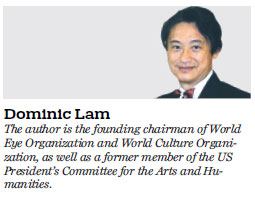Securing a better tomorrow for Hong Kong
Updated: 2017-07-01 08:30
(HK Edition)
|
|||||||||
As we celebrate the 20th anniversary of Hong Kong's reunification with the motherland, it might be interesting to explore some concrete ways for building a better tomorrow for this great city.
When it comes to a brighter future for Hong Kong, education must rank as a top priority. In this regard our new Chief Executive Carrie Lam Cheng Yuet-ngor has already made a good start, initially through additional government funding. However, like most important projects, money alone is not enough - it must be combined with great leadership, correct strategy and consistent implementation. Accidentally, I acquired some experience in education policies when I was appointed by former United States president George H.W. Bush to be a member of the President's Committee on the Arts and Humanities (PCAH) in 1988. One of the committee's top priorities was to examine the status of US education because of several concerns. Firstly US students were doing poorly in international competitions such as math, science, languages and so forth. Secondly the US economy was quite weak in the 1980s and important industries such as automobiles - which had been dominated by US makers such as Ford and General Motors - and electronic products such as television sets - formerly dominated by such firms as RCA and Zenith - were taken over by Japanese brands. Even the White House was using Japanese TV and other devices. This brought up the question of whether US education was inferior and negatively impacted the economy and industries.

An Education Subcommittee of PCAH was therefore established to examine and assess the effectiveness of the system and to produce an Education 2000 report. After two years of in-depth analyses, our conclusion was that the US education system was doing just fine. The poor exam results were due to the fact that US students were encouraged to spend more time thinking, asking questions and playing, and less time memorizing. The domination by Japan in the manufacturing sectors was probably not the result of poor US education, but rather because the world's economies were rapidly switching from traditional industrial bases to intellectual and high-profit high-tech bases such as information technology and biotechnology. But within a few years of our report, the world took notice of such companies as Apple, Microsoft, Genetic, Amgen and subsequently Yahoo, Google and Amazon which have changed our lives forever in many ways.
Furthermore, to date, the world's two most economically strong and intellectually powerful nations - US and Germany - both utilize an education system that encourages, in conscious and subconscious ways, creativity and innovation.
Creativity is a term many people use but few define. To me, it can be summarized by 3Cs:
Curiosity - that is, encourage children to be involved or play with what they are interested in and ask lots of questions. In fact, the importance of asking questions has been known for thousands of years in China. We all know that knowledge is of paramount importance in life, that's why in China knowledge is called "learn to ask". Thus, knowing the answer may not be knowledge, but knowing to ask the right question certainly is!
Courage - that is, when one finds a project worthwhile doing, have the courage to pursue it even in the face of ridicule. The more innovative you are, the more people will think that it is impossible. A good example is Albert Einstein's relativity theory.
Continuity - that is, be persistent even in the face of failure and keep at it, because very few important projects are successful or appreciated at first go. My good friend actor Dustin Hoffman once gave me this great advice, which I follow religiously: "In the words of Samuel Beckett: Fail, fail again - and then fail better".
Taken together, Hong Kong's educational system will be much more effective and rewarding, and the city's mission to build a successful innovation industry more likely if the above lessons are learned. In this regard, the central government and Shenzhen's commitment to high-tech is clearly demonstrated by the recent appointment of Wang Weizhong, former vice-minister of science and technology, as its Party secretary.
Of course, there are many other significant matters to make for Hong Kong becoming a more compassionate, prosperous and happy city, such as better and wiser healthcare and welfare for Hong Kong citizens, especially the rapidly increasing population of elderly people. A more determined effort to help young people strengthen their faith in the future in Hong Kong by providing better housing and other living conditions is also vital. In the end, a strong and able government leadership is obviously of utmost importance to building a better tomorrow for Hong Kong.
(HK Edition 07/01/2017 page1)